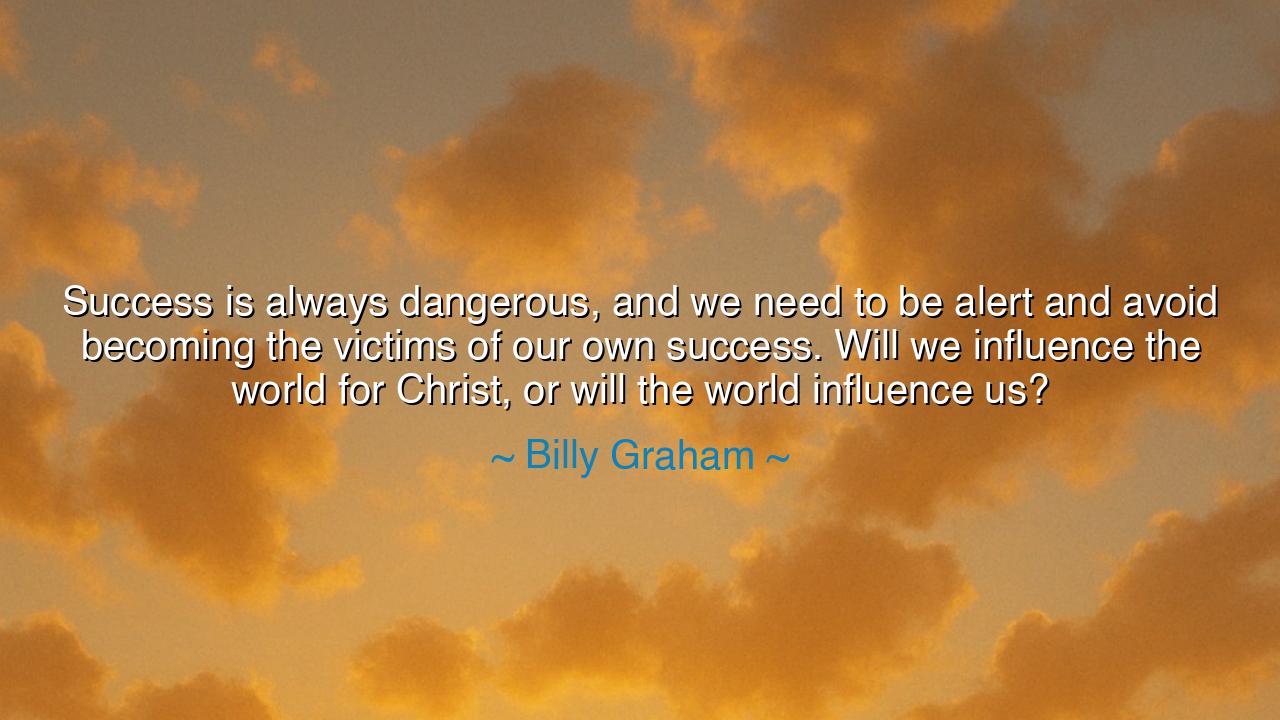
Success is always dangerous, and we need to be alert and avoid
Success is always dangerous, and we need to be alert and avoid becoming the victims of our own success. Will we influence the world for Christ, or will the world influence us?






Hear the words of the great evangelist, Billy Graham, who declared: “Success is always dangerous, and we need to be alert and avoid becoming the victims of our own success. Will we influence the world for Christ, or will the world influence us?” These words are a warning and a call to vigilance. For Graham knew that what we call success—fame, wealth, accomplishment, influence—is not only a blessing, but also a trial. It is a fire that can refine or destroy, a crown that can be worn with humility or become a chain of pride.
The danger of success lies in its power to seduce. When men taste triumph, they are tempted to believe themselves invincible, to forget the hand that raised them, to forsake the humility that once kept them strong. Graham speaks as one who had seen many fall—not because of failure, but because of triumph. For failure humbles, but success can intoxicate. And so he warns us: be alert, for the enemy does not only strike in weakness; he often strikes in the hour of victory.
History bears witness. Consider the rise and fall of King Solomon. Blessed with wisdom, wealth, and renown, he built a temple to the Lord and ruled with majesty. Yet in his success, his heart was led astray by foreign idols and worldly pleasures. The very prosperity that should have magnified his devotion became his downfall. Solomon became a victim of his own success, showing us that greatness without vigilance can turn to ruin.
Yet there are also examples of those who bore success without being consumed. Think of George Washington, who, after leading his nation to independence, was offered the chance to seize power as a king. But he refused, choosing instead to step down in humility, shaping the soul of a republic. He had tasted victory, yet he was not enslaved by it. He chose influence over indulgence, humility over dominion, and thus his legacy endures.
The deeper meaning of Graham’s words points us to the eternal struggle: Will we use our success to shape the world for good, or will the world’s allure shape us into its likeness? For every gift, every triumph, every crown is a trust placed upon us. Success is not the end of the journey, but the beginning of a greater responsibility. It is not freedom from temptation, but a deeper testing of the heart.
The lesson for us is clear: guard your heart in times of victory as much as in times of trial. Remember always that success is a gift, not a possession. Use it to serve, not to exalt yourself. Let your influence lift others upward, not pull you downward into pride or compromise. Ask yourself daily: Am I shaping the world for good, or is the world reshaping me in its image?
Practical actions lie before us. When success comes, remain grounded in gratitude. Surround yourself with voices of truth who will remind you of humility. Give back from what you have gained, that your victories may become blessings for others. Keep your devotion stronger than your ambition, so that success serves as a tool of righteousness rather than a trap of pride.
Thus, the wisdom of Billy Graham endures: success is dangerous, but not undefeatable. Those who remain vigilant, humble, and faithful will not become victims of their own triumphs, but victors who wield success as a servant of higher purpose. Take this teaching, and remember always that the crown of success shines brightest when it is laid at the feet of truth.






AAdministratorAdministrator
Welcome, honored guests. Please leave a comment, we will respond soon